- Home
- William Gibson
All Tomorrow's Parties bt-3 Page 21
All Tomorrow's Parties bt-3 Read online
Page 21
'Maryalice, Creedmore said, thoughts elsewhere, waving in the general direction of the back of the bar. He set off, apparently after Shoats.
Rydell ignored the man with the tanto and headed for the back of the bar, where he found Maryalice seated alone at a table. There was a hand-lettered sign, on brown corrugated cardboard, done in different colored felt pens, that said 'BUELL CREEDMORE & HIS LOWER COMPANIONS, each of the Os done in red as a little happy face. The table was solid, side to side, with empties, and Maryalice looked like somebody had just whacked her in the head with something that it didn't leave a mark. 'You A&R? she asked Rydell, as if startled from a dream.
'I'm Berry Rydell, he said, pulling out a chair and unslinging the bag with the projector. 'Met earlier. You're Maryalice.
'Yes, she smiled, as if pleased with the convenience of being so reminded, 'I am. Wasn't Buell wonderful?
Rydell sat, trying to find a way to manage it that kept the rib from killing him. 'They got an outlet around here, Maryalice? He was opening the duffel, pushing it down around the sides of the projector, pulling out the power cable.
'You're A&R, Maryalice said, delighted, seeing the projector, 'I knew you were. Which label?
'Plug this in there, please? Rydell pointed to an outlet just beside her, on the scabrous wall, and passed her the plug end of the cable. She held it close to her face, blinked at it, looked around, saw the socket. Plugged it in. Turned back to Rydell, as if puzzled by what she'd just done.
The man with the tanto brought over a chair, placed it at the table, and took a seat opposite Maryalice. He did it, somehow, in a way that occupied as little of anyone else's consciousness as possible. 'Now you, Maryalice said to him, with a quick glance down to check the state of her bodice, 'you are pretty clearly a label head, am I correct?
'Label?
'I knew you were, Maryalice said.
Rydell heard the projector humming.
And then Rei Toei was there, standing beside their table, and Rydell knew that once again he'd seen her naked for a second, glowing, white, but now she wore an outfit identical, it seemed, to Maryalice's. 'Hello, Berry Rydell, she said, then looked down and tightened the strings at the top of the black thing she wore.
'Hey, Rydell said.
'Well, suck me raw with a breast pump, Maryalice said, voice soft with amazement, as she stared at Rei Toei. 'I swear to God I didn't see you standing there.
The man with the tanto was looking at Rei Toei too, the light of her projection reflected in the round lenses.
'We are in a nightclub, Berry Rydell?
'A bar, Rydell said.
'Rez liked bars, she said, looking around at the crowd. 'I have the impression that people in bars, though they seem to be talking to one another, are actually talking to themselves. Is this because higher brain function has been suppressed for recreational purposes?
'I just love your top, Maryalice said.
'I am Rei Toei.
'Maryalice, Maryalice said, extending her hand. The idoru did likewise, her hand passing through Maryalice's.
Maryalice shivered. 'Had about enough, this evening, she said, as if to herself.
'I am Rei Toei. To the man with the tanto.
'Good evening.
'I know your name, she gently said to the man. 'I know a great deal about you. You are a fascinating person.
He looked at her, expression unchanged. 'Thank you, he said. 'Mr. Rydell, is it your intention to remain here, with your friends?
'Time being, Rydell said. 'I have to phone somebody.
'As you will, the man said. He turned to survey the entrance, and just then the scarf came strolling in and saw them all, immediately.
More trouble, thought Rydell.
51. THE REASON OF LIFE
LANEY'S two favorite Tokyo bars, during the happier phase of his employment at Paragon-Asia Dataflow, had been Trouble Peach, a quiet sit-and-drink place near Shimo-kitazawa Station, and The Reason of Life, an art bar in the basement of an office building in Aoyama. The Reason of Life was an art bar, in Laney's estimation, by virtue of being decorated with huge black-and-white prints of young women photographing their own crotches with old-fashioned reflex cameras. These were such modest pictures that it took you, initially, a while to figure out what they were doing. Standing, mostly, in crowded streetscapes, with the camera on the pavement, between their feet, smiling into the photographer's lens and thumbing a manual release. They wore sweaters and plaid skirts, usually, and smiled out at you with a particularly innocent eagerness. Nobody had ever explained to Laney what this was all supposed to be about, and it wouldn't have occurred to him to ask, but he knew art when he saw it, and he was seeing it again now, courtesy of the Rooster, who somehow knew Laney liked the place in Aoyama and had decided to reproduce it, off the cuff, here in the Walled City.
In any case, Laney prefers it to the barbershop made of misaligned graphics tiles. You can just look at these girls, in cool monochrome renditions of wool and flesh and other textures of cities, and he finds that restful. It was strange though, to sit in a bar when you didn't have a body present.
'They're coy about it, the Rooster is saying, of Libia and Paco and how it may be that they've succeeded in hacking Cody Harwood's most intensely private means of communication. 'They may have physically introduced an agent into Harwood Levine's communications satellite. Something small. Very small. But how could they have controlled it? And how long would it have taken, undetected, to effect a physical alteration in the hardware up there?
'I'm sure they found a more elegant solution, Klaus says, 'but the bottom line is that I don't care. Access is access. The means to access are academic. We've hacked Harwood's hotline. His red telephone.
'And you have a tendency to pat yourselves on the back, Laney says. 'We know that Harwood's had 5-SB, but we don't know why, or what he's doing with nodal apprehension. You seem to be convinced it's something to do with Lucky Dragon and this half-baked Nanofax launch.
'Aren't you? asks Klaus. 'Nanofax units are going into every Lucky Dragon in the world. Right now. Literally. Most of them are fully installed, ready to go operational.
'With the faxing of the first Taiwanese teddy bear from Des Moines to Seattle? What's he hope to gain? Laney concentrates on his favorite girl, imagining her thumb on the plunger of a hypodermic-style manual release.
'Think network, the Rooster puts in. 'Function, even ostensible function, is not the way to look at this. All function, in these terms, is ostensible. Temporary. What he wants is a network in place. Then he can figure out what to do with it.
'But why does he need to have something to do with it in the first place? Laney demands.
'Because he's between a rock and a hard place, responds Klaus. 'He's the richest man in the world, possibly, and he's ahead of the curve. He's an agent of change, and massively invested in the status quo. He embodies paradoxical propositions. Too hip to live, too rich to die. Get it?
'No, Laney says.
'We think he's like us, basically, Klaus says. 'He's trying to hack reality but he's going strictly big casino, and he'll take the rest of the species with him, however and whatever.
'You have to admire that, don't you? says the Rooster, out of the depths of his silent faux-Bacon scream.
Laney isn't sure that you do.
He wonders if the Rooster's reiteration of The Reason of Life incorporates the tiny, six-seater bar downstairs, the darker one where you can sit beneath very large prints of the pictures the girls themselves were taking: huge abstract triangles of luminous gelatin-printed white panty.
'Can you get me that kind of look-in on Harwood's stuff anytime?
'Until he notices you, we can.
52. MY BOYFRIEND'S BACK
CHEVETTE had had a boyfriend named Lowell, when she'd first lived on the bridge, who did dancer.
Lowell had had a friend called Codes, called that because he tumbled the codes on hot phones and notebooks, and this Saint Vitus reminded her
of Codes. Codes hadn't liked her either.
Chevette hated dancer. She hated being around people when they were on it, because it made them selfish, too pleased with themselves, and nervous; suspicious, too prone to make things up in their heads, imagining everyone out to get them, everyone lying, everyone talking behind their back. And she particularly hated watching anyone actually do the stuff, rub it into their gums the way they did, all horrible, because it was just so gross. Made their lips numb, at first, so they'd drool a little, and how they always thought that was funny. But what she hated about it most was that she'd ever done it herself, and that, even though she had all these reasons to hate it, she still found herself, watching Saint Vitus vigorously massaging a good solid hit into his gums, feeling the urge to ask him for some.
She guessed that was what they meant by it being addictive. That she'd gotten just that little edge of it off the country singer sticking his tongue in her mouth (and if that was the only way to get it, she thought, she'd pass) and now the actual molecules of diz were twanging at receptor sites in her brain, saying gimme, gimme. And she'd never even been properly strung out on the stuff, not how they meant it when they said that on the street.
Carson had coordinated on a Real One sequence about the history of stimulants, so Chevette knew that dancer was somewhere out there past crack cocaine in terms of sheer gotcha. The addiction schedule was a little less merciless, in terms of frequency, but she figured she'd still just barely missed it, chipping with Lowell. Lowell who'd explain in detail and at great length how the schedule he'd worked out for using it was going to optimize his functionality in the world, but never result in one of those ugly habit deals. You just had to know how to do it, and when to do it, and most important of all, why to do it. Powerful substance like this, Lowell would explain, it wasn't there just for any casual jack-off recreational urge. It was there to allow you to do things. To empower you, he said, so that you could do things and, best of all, finish them.
Except that what Lowell had mainly wanted to do, dizzed, was have sex, and the diz made it impossible for him to finish. Which had been okay by Chevette, because otherwise he tended to finish a little on the quick side. The Real One sequence had said that dancer made it possible for men to experience something much more like the female orgasm, a sort of ongoing climax, less localized and, well, messy.
Dancer was pretty deadly stuff, in terms of getting people into bed in the first place. Strangers doing dancer together, if there was any basis for attraction at all, were inclined to decide that that was basically a fine idea, and one to be acted on right away, but only provided the other party seemed agreeable to doing it until both were pretty well dead.
And people did wind up dead around the stuff; hearts stopped, lungs forgot to breathe, crucial tiny territories of brain blew out. People murdered one another when they were crazy on the stuff, and then in cold blood just to get some more.
It was one ugly substance and no doubt about it.
'You got any more of that? she asked Saint Vitus, who was dabbing at the spit-slick corners of his mouth with a wadded-up tissue, dots of blood dried brown on it.
Saint Vitus fixed her with his slitty glasses. 'You've got to be kidding, he said.
'Yeah, said Chevette, pushing off the stool, 'I am. Must've been the time of night. How could she even have thought that? She could smell his metallic breath in the sound box.
'Got it, said Tessa, pulling off the glasses. 'Crowd's thinning. Chevette, I'll need you to help me get the camera platforms together.
Saint Vitus smirked. At the thought, Chevette guessed, of somebody else having to do something like work.
'You haven't seen Carson, have you? Chevette asked, stepping to the window. The dwindling crowd, seen from above, was moving in one of those ways that there was probably a logarithm for: milling and dispersing.
'Carson?
She spotted Buell Creedmore, just in front of the stage, talking with a big guy in a black jacket, his back to the sound booth. Then the big guitar player, the one with the squashed cowboy hat, jumped down from the stage and seemed to be giving Creedmore a hard time. Creedmore tried to say something, got shut up, then managed to say something short, and by the look on his face, not too sweet, and the guitar player turned and walked away. Chevette saw Creedmore say something to the other guy, gesturing back in her direction, and this one turned and headed that way, his face concealed, from just this angle, by a dusty swoop of black-painted cable.
'He was here before, Chevette said. 'That's why I frenched the meshback and ran out the door. Didn't you wonder?
Tessa looked at her. 'I did, actually. But I thought maybe I was just getting to know you better. She laughed. 'Are you sure it was him?
'It was him, Tessa.
'How would he know we're up here?
'Somebody told him at the house? You talked enough, before, about your docu.
'Maybe, Tessa said, interest waning. 'Help me get the platforms tethered, okay? She handed Chevette four black nylon tethers, each one tipped with a mini-bungee and a metal clip.
'Listen, Chevette said, 'I'm not up for a night at Cognitive Dissidents, okay? I don't think you are either. I just watched your friend here gum enough dancer to wire a mule.
'Chevette, Tessa said, 'we're up here to document, remember? We're going interstitial.
Saint Vitus sniggered.
'I think where we're going is to sleep, Tessa. Where's the truck?
'Where we parked it.
'How'd you get the balloons back here?
'Elmore, Tessa said. 'Has one of those caps, and an ATV to go with it.
'See if you can find him again, Chevette said, starting down the ladder. 'We could use a lift back.
Chevette wasn't sure what it would actually take to get Tessa to give up on Cognitive Dissidents. Worst case, she might actually have to go there, if only to make sure Tessa was okay. Cog Diss was a rough enough place even if you didn't have your head buried in a pair of video glasses.
She went down the ladder and headed out onto the floor, where God's Little Toy was already descending, under Tessa's control. She reached up, got it tethered, and turned to signal Tessa, in the sound booth, to start bringing the others down.
And found herself looking, for however many dreamlike seconds, before he hit her, into Carson's eyes.
Hard and in the face, just like he'd done before, and she saw those same colors, like a flashback; saw herself falling back, across the big beige couch in his loft-space, blood splashing from her nose, and still not believing it, that he'd done that.
Except that here she went over into a couple of Creedmore's remaining audience, who caught her, laughing, saying 'Hey. Whoa, and then Carson was on her again, grabbing a handful of Skinner's jacket — 'Hey, buddy, said one of the men who'd caught her, holding up his spread hand as if to block the second punch that Carson, his face as calm and serious as she'd seen it in the editing booth at Real One, was aiming at her. And looking into Carson's eyes she saw nothing there like hatred or anger, only some abstract and somehow almost technical need.
Carson tried for her, past that stranger's upraised hand, and her protector yelped as one of his fingers got bent back. It deflected the blow, though, and gave Chevette time to twist out of that grip.
She backed off two steps and shook her head, trying to clear it. Something was wrong with her eyes.
Carson came after her, that same look on his face, and in that instant she knew that she knew neither who he was nor what it was that was wrong with him.
'You just didn't get it, did you? he said, or that was what she thought she heard him say, feeling a tear run down from her swelling eye, her head still ringing.
She took a step back. He came on.
'You just didn't get it.
And then a hand came down on his shoulder and he spun around. And went down, the man behind him having done something that Chevette hadn't seen.
And she saw that it was Rydell.
It wasn't.
It was.
Rydell in a rent-a-cop's black nylon jacket, looking at her with an expression of utter and baffled amazement.
And Chevette got it, right then and absolutely, that she was dreaming, and felt the most enormous sense of relief, because now she would wake up, surely, into a world that would make sense.
On the floor, Carson, rolling over, got to his knees, stood up, shook himself, brushed a squashed cigarette-filter from the sleeve of his jacket, and suckerpunched Rydell, who saw it coming and tried to move aside, so that Carson's fist slammed into his ribs, rather than his stomach, as intended.
And Rydell screamed, in shrill animal pain, doubled over. And that was when the guy with the black leather car-coat, the fresh-looking black buzzcut, black scarf knotted up high around his neck, this guy Chevette had never seen before, stepped up to Carson. 'Mistake, she thought she heard him say. He took something from the pocket of his black coat. Then: 'You're not on the menu.
And he shot Carson, right up close, without looking down at the gun in his hand.
And it was not a loud sound, not loud at all, more like the sound of a large pneumatic nail-gun, but it was final and definitive and accompanied by a yellow-blue flash, and Chevette could never remember, exactly, seeing this, though she knew she had: Carson blown back by however many thousand foot-pounds of energy trying to find their way to kinetic rest at just that one instant in his body.
But it didn't take, in memory; it did not stick, and she would be grateful.
And grateful too, though for other reasons, that this was when Tessa, in the sound booth overhead, killed the lights.
53. (You Know I Can't Let You) SLIDE THROUGH MY HANDS
RYDELL knew that sound: a subsonic projectile through a silencer that slowed it even more, draining off the expanding gases of the ignited charge, and still the muzzle velocity would be right up there, and the impact, where it was localized.

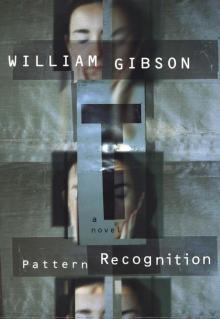 Pattern Recognition
Pattern Recognition Spook Country
Spook Country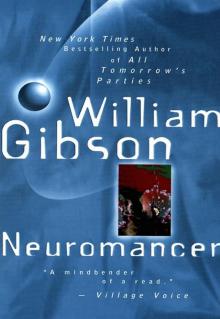 Neuromancer
Neuromancer Skinner's Room
Skinner's Room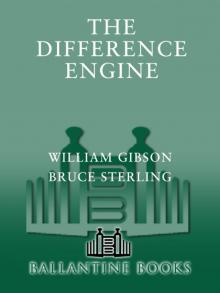 The Difference Engine
The Difference Engine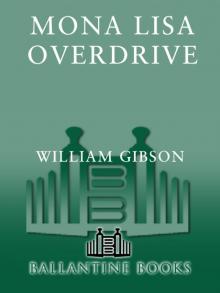 Mona Lisa Overdrive
Mona Lisa Overdrive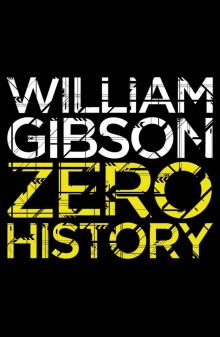 Zero History
Zero History The Peripheral
The Peripheral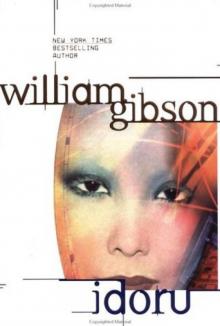 Idoru
Idoru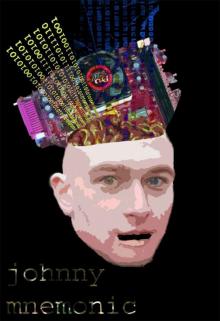 Johnny Mnemonic
Johnny Mnemonic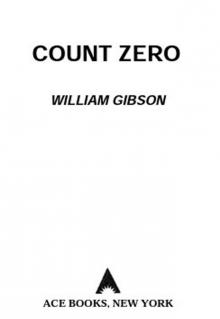 Count Zero
Count Zero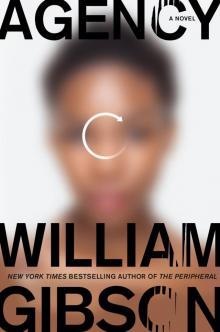 Agency
Agency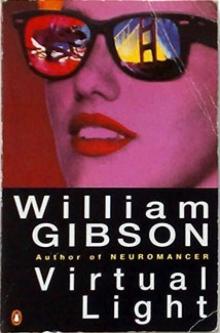 Virtual Light
Virtual Light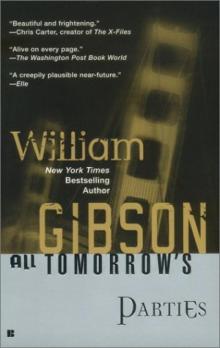 All Tomorrow's Parties
All Tomorrow's Parties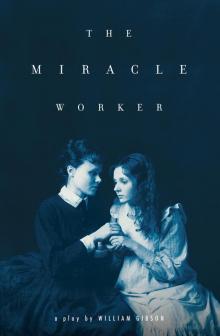 The Miracle Worker
The Miracle Worker Disneyland with the Death Penalty
Disneyland with the Death Penalty Idoru tb-2
Idoru tb-2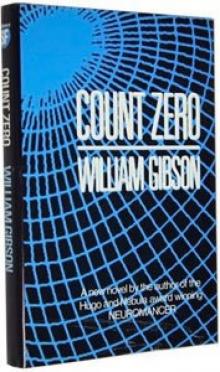 Count Zero s-2
Count Zero s-2 The Gernsback Continuum
The Gernsback Continuum New Rose hotel (tales)
New Rose hotel (tales)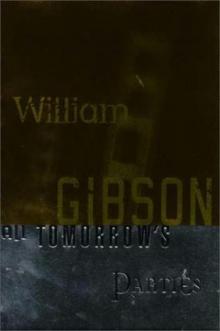 All Tomorrow's Parties bt-3
All Tomorrow's Parties bt-3 Hinterlands
Hinterlands Thirteen Views Of A Cardboard City
Thirteen Views Of A Cardboard City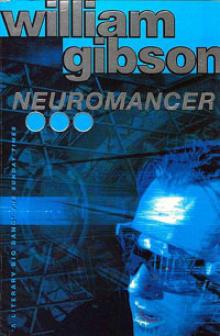 Neuromancer ts-1
Neuromancer ts-1 Virtual light b-1
Virtual light b-1